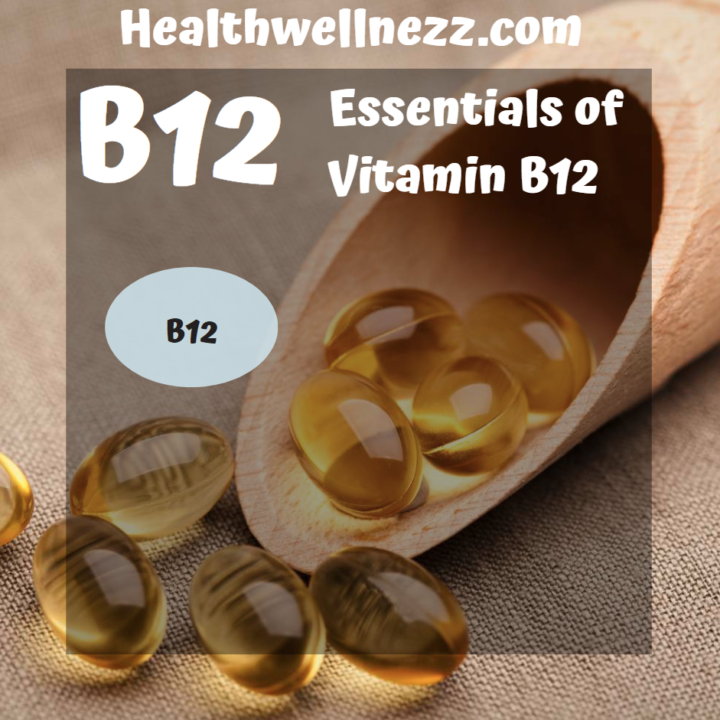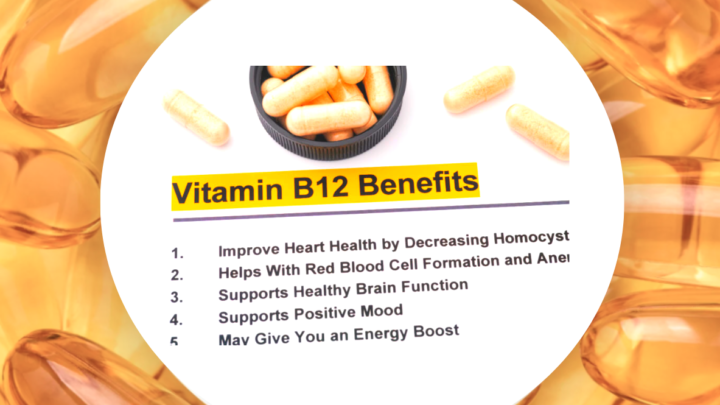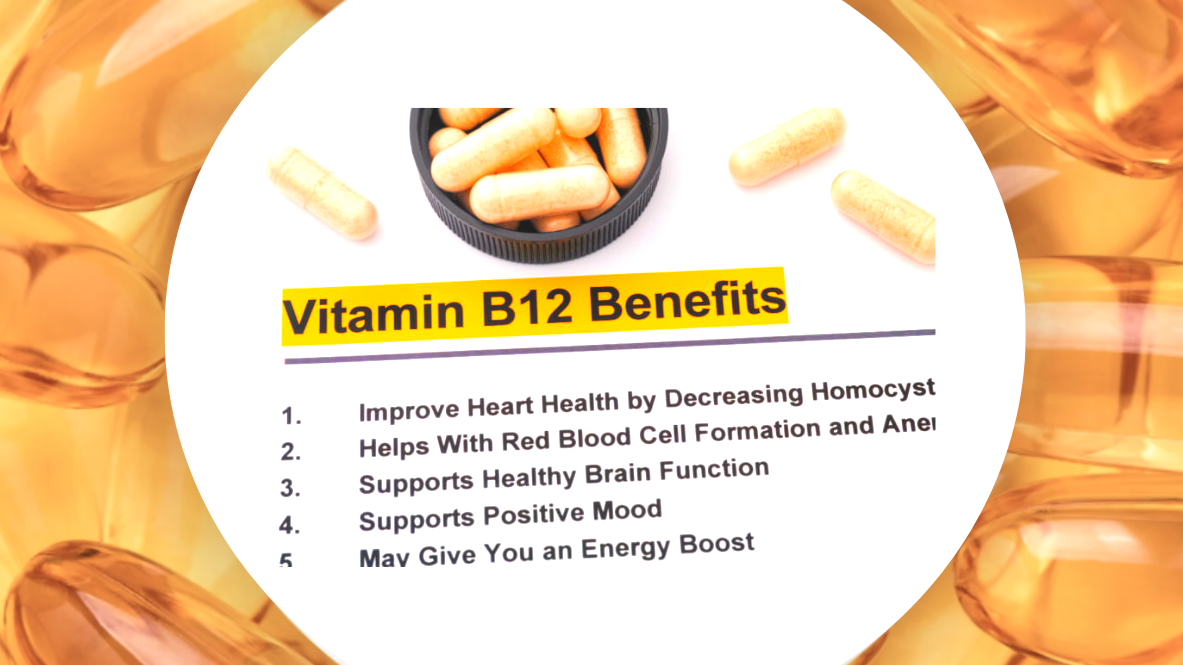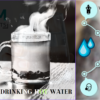Vitamin B12, also known as cobalamin, is a crucial nutrient that plays a significant role in maintaining our overall health. While it might not get as much attention as other vitamins, its importance cannot be overstated. In this comprehensive guide, we’ll delve into everything you need to know about vitamin B12, from its functions in the body to dietary sources, deficiency symptoms, and even supplementation.
Understanding Vitamin B12
- Vitamin B12 is a water-soluble vitamin that belongs to the B-vitamin family. Unlike most other vitamins, B12 is unique in that it contains the element cobalt, which is why it’s sometimes referred to as cobalamin. This vitamin plays a vital role in numerous physiological processes, making it indispensable for our well-being.
Functions of Vitamin B12
- Energy Production: Vitamin B12 is crucial for the conversion of food into energy. It is an essential cofactor in the metabolism of fats, carbohydrates, and proteins, helping our bodies extract the energy they need from the foods we consume.
- Blood Cell Formation: B12 is essential for the production of red blood cells, which transport oxygen throughout the body. Without an adequate supply of B12, a person can develop anemia, leading to fatigue and weakness.
- Nervous System Health: It is vital for maintaining a healthy nervous system. B12 plays a role in the production of myelin, a protective sheath that covers nerves, facilitating efficient nerve signal transmission.
- DNA Synthesis: B12 is critical for DNA synthesis and the maintenance of genetic material. This is particularly important during periods of rapid growth and development.

Dietary Sources of Vitamin B12
- Vitamin B12 is primarily found in animal-based foods, making it challenging for vegetarians and vegans to obtain sufficient amounts from their diets. Here are some excellent dietary sources of vitamin B12:
- Meat and Seafood: Beef, chicken, fish (such as salmon and trout), and shellfish (like clams and mussels) are rich sources of B12.
- Dairy Products: Milk, cheese, and yogurt provide a good supply of this vitamin.
- Eggs: Both the yolk and white of eggs contain B12.
- Fortified Foods: Many plant-based foods, like breakfast cereals and plant-based milk alternatives, are fortified with B12. Check the labels for details.
- Supplements: For those at risk of deficiency, B12 supplements are readily available. Always consult with a healthcare professional before starting any supplementation.
- vitamin b12 foods vegetarian
- For vegetarians, sources of vitamin B12 can be somewhat limited, as this essential nutrient is commonly found in animal products. However, there are still vegetarian-friendly options to ensure an adequate intake of vitamin B12:
- Dairy Goodness:
- Drink milk, eat yogurt, and enjoy cheese.
- Look for Fortified Foods:
- Some plant-based foods are fortified with vitamin B12. Check out:
- Plant-based milk like soy, almond, or rice milk
- Breakfast cereals
- Nutritional yeast
- Some plant-based foods are fortified with vitamin B12. Check out:
- Consider Supplements:
- If it’s tricky to get enough B12 from food, you can think about taking vitamin B12 supplements. Just talk to a doctor to know how much you might need.
- Dairy Goodness:
- Remember, even though many plant foods don’t have much vitamin B12, you can still find ways to get it through fortified foods or supplements. It’s a good idea to keep an eye on your B12 levels, and if you’re unsure, ask a healthcare pro for advice.
- For vegetarians, sources of vitamin B12 can be somewhat limited, as this essential nutrient is commonly found in animal products. However, there are still vegetarian-friendly options to ensure an adequate intake of vitamin B12:
what foods have vitamin b12 – for a Balanced Diet
- Vitamin B12 is like a superhero for our bodies – it helps our nerves, makes our blood cells strong, and keeps everything running smoothly. It’s usually in meat, but don’t worry if you don’t eat meat; there are other tasty options. Let’s explore some foods full of vitamin B12 to keep you feeling great!
- Animal Foods:
- Meat Magic: Beef, pork, lamb, and chicken are like B12 powerhouses.
- Fishy Friends: Fish like salmon, trout, tuna, and sardines are great B12 buddies.
- Seafood Surprises: Clams, mussels, crabs, and oysters from the sea also have lots of B12.
- Special Organs: Liver and kidney might sound strange, but they’re super rich in B12.
- Dairy and Eggs Delights
- Moo-licious Dairy: Milk and yogurt are tasty sources of B12 if you like dairy.
- Cheese Cheers: Some cheeses, like Swiss and mozzarella, are yummy and have B12.
- Egg-citing Eggs: Don’t forget eggs, especially the yellow part – they’re full of B12 goodness.
- Sneaky B12 in Other Foods:
- Plant-Powered Milk: If you like plant-based milk (like soy, almond, or rice milk), some types have extra B12 added.
- Breakfast Magic: Certain cereals become B12 heroes when they’re fortified, making breakfast a happy and healthy start.
- Yeast Feast: Nutritional yeast, a cheesy-like sprinkle, is a cool choice for B12, and you can sprinkle it on all sorts of meals.
- Animal Foods:
- Vitamin B12 is like the secret sauce to feeling awesome. Even if you don’t eat meat, there are loads of delicious options to get enough B12. Whether you love animal foods, dairy and eggs, or choose plant-powered options, keeping your B12 levels happy will keep you healthy and smiling!
vitamin b12 vegetables and fruits
- Guess what? Vitamin B12 is not just for meat lovers – some plants have it too! Even though most B12 comes from animals, there are some plant-based options that can give you a little bit of this special vitamin. Let’s explore these plant-powered sources in a simple way.
- Yummy Milk Alternatives:
- Soy Milk: Some soy milk is like a B12 superhero – check the label!
- Almond Milk: Certain almond milks have B12 added for an extra boost.
- Rice Milk: Keep an eye out for rice milk that’s been fortified with vitamin B12.
- Breakfast Cereal Surprise:
- Good Morning Cereals: Certain cereals make breakfast exciting by adding B12. Look for the ones that say they’re fortified.
- Fancy Yogurt Alternatives:
- Almond Yogurt: Look for almond yogurt brands that care about B12. Check the label to be sure.
- Cheesy Yeast Goodness:
- Nutritional Yeast Fun: Nutritional yeast is like a magical sprinkle that adds B12 to your popcorn, salads, or pasta.
- Orange Juice Boost:
- Citrus Sip: Some orange juices are friends with B12. Look at the label to find the ones that have it.
- Helpful Supplements:
- Supplements: If you want a sure way to get B12, there are special vitamins you can take. Just talk to a doctor to know which one is right for you.
- Yummy Milk Alternatives:
- Getting some B12 from plants is possible and can be tasty too! By trying these plant-powered foods and, if needed, talking to a doctor about supplements, you can make sure you’re getting enough B12 for a happy and healthy life. Keep it simple, keep it tasty, and keep feeling good!
vitamin b12 deficiency symptoms
- A deficiency in vitamin B12 can lead to a range of health issues, and it’s essential to recognize the signs early to prevent complications. Common symptoms of B12 deficiency include.
- Fatigue: Feeling excessively tired and weak.
- Anemia: A type of anemia known as megaloblastic anemia, which can lead to pale skin, weakness, and shortness of breath.
- Nervous System Problems: Numbness, tingling, and difficulty walking may occur due to nerve damage.
- Mood Changes: Depression, irritability, and even memory problems can result from B12 deficiency.
- Digestive Issues: Digestive problems, such as diarrhea or constipation, may be present.
Who is at Risk of B12 Deficiency?
- Certain individuals are more susceptible to B12 deficiency. These include:
- Vegans and Vegetarians: As they do not consume animal products, they should monitor their B12 levels and consider supplementation.
- Older Adults: The ability to absorb B12 decreases with age.
- People with Digestive Disorders: Conditions like celiac disease and Crohn’s disease can impair B12 absorption.
- Gastric Surgery Patients: Surgeries that affect the stomach or intestines can limit B12 absorption.
- Medication Users: Some medications, such as proton pump inhibitors and metformin, can reduce B12 absorption.
B12 Supplementation
- Supplementation can be a practical way to address or prevent a B12 deficiency, especially for those at risk or with confirmed deficiencies. Here’s what you should know about B12 supplementation:
- Forms of B12 Supplements
- Cyanocobalamin: This synthetic form of B12 is stable and cost-effective. It’s commonly used in supplements and fortified foods.
- Methylcobalamin: This is the active, natural form of B12, and it may be more readily absorbed by the body. It’s often preferred for supplementation.
- Hydroxocobalamin: Used in injections and for specific medical conditions, it converts into active B12 forms in the body.
- Dosage
- The appropriate dosage of B12 supplements can vary based on individual needs and medical conditions. It’s best to consult a healthcare professional for personalized recommendations. However, common dosages range from 250 micrograms to 1,000 micrograms or more per day.
- Oral Supplements
- Oral B12 supplements are widely available and convenient. They come in various forms, including capsules, tablets, and gummies. While they are generally effective for maintaining B12 levels, individuals with absorption issues might benefit from sublingual or liquid B12 supplements, which are absorbed more efficiently through the mucous membranes in the mouth.
- Injections
- For individuals with severe B12 deficiencies or conditions that hinder absorption, healthcare providers may administer B12 injections. These injections ensure a direct and immediate supply of B12 to the body.
- Monitoring
- Regular monitoring of B12 levels is essential, especially for individuals on long-term supplementation or those with underlying medical conditions. This helps adjust the dosage as needed and prevent excessive intake.
vitamin B12 Myths and Misconceptions
- There are several misconceptions about vitamin B12 that need to be addressed:
- Myth 1: B12 Supplements Are Harmful
- B12 supplements are generally safe when taken at appropriate doses. However, excessive B12 intake from supplements can lead to adverse effects. It’s essential to follow recommended dosages and consult with a healthcare professional if you have any concerns.
- Myth 2: B12 Deficiency Only Affects Vegans
- While vegans are at higher risk of B12 deficiency, it can affect anyone. Vegetarians, older adults, and individuals with digestive disorders can also experience B12 deficiency.
- Myth 3: B12 Deficiency Is Rare
- B12 deficiency is more common than you might think. Many people have suboptimal B12 levels without realizing it. It’s a silent epidemic that can lead to various health problems if left unaddressed.
- Myth 4: More B12 Is Always Better
- Excessive B12 intake is not necessarily better. Your body can absorb only a limited amount at a time, and excessive intake can lead to imbalances and potential health issues. Follow recommended dosages for your specific situation.
- Myth 1: B12 Supplements Are Harmful
throughout life may contribute to better cognitive function and brain health as you age.
B12 in Vegetarian and Vegan Diets
- Vegetarians and vegans need to be especially vigilant about their B12 intake since plant-based diets typically lack natural sources of this vitamin. To meet their B12 needs, these individuals should consider:
- Consuming fortified foods: Many plant-based milk alternatives, breakfast cereals, and meat analogs are fortified with B12. Check product labels to identify fortified options.
- Taking B12 supplements: Vegetarians and vegans may consider taking B12 supplements to ensure they meet their daily requirements.
- Regular B12 testing: Individuals following strict vegetarian or vegan diets should schedule regular B12 tests to monitor their levels and adjust their dietary or supplementation practices accordingly.

vitamin b12 benefits
-
B12 and Heart Health
- Research suggests that adequate B12 levels may play a role in maintaining heart health. Elevated levels of homocysteine, a compound linked to cardiovascular disease, can be lowered by sufficient B12 intake. By promoting healthy homocysteine levels, B12 may contribute to a lower risk of heart disease.
- B12 and Skin Health
- Healthy skin requires proper nutrition, including vitamin B12. B12 deficiency can manifest in various dermatological symptoms, such as dryness, hyperpigmentation, and vitiligo. Ensuring you get enough B12 can contribute to vibrant and healthy skin.
- B12 and Brain Health
- Emerging research is shedding light on the connection between B12 and brain health. B12 deficiency has been linked to cognitive decline and an increased risk of neurodegenerative diseases, such as Alzheimer’s disease. Maintaining optimal B12 levels
-
B12 and Hair Health
- Your hair’s health is closely connected to your overall nutritional status, including B12 levels. B12 deficiency can lead to hair loss and early graying. By maintaining adequate B12 intake, you can support strong and vibrant hair.
- B12 and Nails
- Brittle nails can also be a sign of B12 deficiency. To promote healthy nails, it’s crucial to ensure you have sufficient B12 in your diet or supplementation routine.
- B12 and Aging
- As we age, our bodies may become less efficient at absorbing B12 from food. This makes maintaining adequate B12 levels even more critical for older adults. Adequate B12 intake can help combat age-related cognitive decline, fatigue, and other health issues.
-
B12 and Mental Health
- B12 plays a crucial role in mental health. Deficiency has been linked to mood disorders, including depression and anxiety. Ensuring you have adequate B12 in your diet may contribute to better emotional well-being.
- B12 and Cancer
- Some studies have suggested that B12 may play a role in cancer prevention. Adequate B12 levels are thought to help maintain DNA integrity, reducing the risk of mutations that can lead to cancer. However, further research is needed to fully understand this relationship.
- B12 and Bone Health
- Emerging research suggests that B12 may be associated with bone health. It appears that B12 influences bone mineral density and may play a role in preventing osteoporosis and fractures.
In this comprehensive guide, we’ve explored the functions of vitamin B12, its dietary sources, deficiency symptoms, who is at risk, supplementation options, and dispelled common myths. We’ve also delved into its significance for various aspects of health, from brain and heart health to skin, hair, and nails, and its role in aging, mental health, cancer prevention, and bone health.
B12 is a nutrient that deserves more recognition, and by understanding its importance and taking steps to maintain adequate levels, you can lead a healthier, more vibrant life. Remember, if you have concerns about B12 deficiency or supplementation, consult with a healthcare professional for personalized guidance.
Also read: What Happens to Your Body When You Walk 10000 Steps a Day ?
frequently asked questions

-
Vitamin B12 ki Kami ke Lakshan or vitamin b12 deficiency symptoms in hindi
- Vitamin B12 ki kami hone par kuch lakshan dikhai dete hain jo hamare swasthya ko prabhavit kar sakte hain. Yeh lakshan hain:
- Thakan aur Kamjori: Aksar thakan mehsoos hona, saath hi sharirik kamjori bhi ho sakti hai.
- Saans Lene mein Dikkat: Vitamin B12 ki kami se saans lene mein taklif ho sakti hai, jisse saans lene mein dikkat hoti hai.
- Chakkar Aana: Kuch logon ko chakkar aane lagte hain jab unka sharir vitamin B12 ko sahi se nahi pata hai.
- Anemia (Raktalpata): Kam vitamin B12 ke karan rakt mein kami ho sakti hai, jisse anemia ho sakta hai. Isse thakan aur pilaapan bhi mehsoos hota hai.
- Muh Ke Char-Mukh Mein Chhale: Vitamin B12 ki kami se muh ke andar char-mukh mein chhale bhi ho sakte hain.
- Baalon Ka Jhadna: Baalon ka jhadna bhi ek lakshan ho sakta hai ki aapko vitamin B12 ki kami ho sakti hai.
- Hriday Sambandhi Samasyayen: Vitamin B12 ki kami se hriday se judi samasyayen bhi ho sakti hain.
- Pet Mein Kharabi: Pet mein kharabi, jaise ki kabj ya gas, bhi vitamin B12 ki kami ka ek lakshan ho sakti hai.
- Yadi aapko in lakshanon mein se kuch mehsoos hota hai, to turant doctor se milke salah lena chahiye. Vitamin B12 ki kami ko sahi karna mahatvapurna hai taki aapka swasthya accha rahe.
- Vitamin B12 ki kami hone par kuch lakshan dikhai dete hain jo hamare swasthya ko prabhavit kar sakte hain. Yeh lakshan hain:
-
is 5000 mcg of vitamin b12 too much to take ?
- Taking 5000 mcg (micrograms) of vitamin B12 every day is much more than what most adults need. Usually, adults only need about 2.4 micrograms of vitamin B12 each day, which is a lot less than 5000 mcg. It’s important to follow the recommended amount unless a doctor suggests otherwise. Too much of anything might not be good for your health. If you’re thinking about taking more, it’s a good idea to talk to a doctor first. They can help you figure out what’s right for you.
-
vitamin b12 normal range ?
- The normal range for vitamin B12 levels is usually between 200 and 900, but this can vary a bit depending on where the test is done. Think of it like this: it’s a measure of how much vitamin B12 is in your blood. If you’re worried about it or have symptoms, it’s best to talk to a doctor. They can help figure out if everything is okay or if you might need some extra help.
-
vitamin b12 dosage for adults over 50 ?
- For grown-ups over 50, the recommended amount of vitamin B12 is about 2.4 micrograms each day. This is similar to what younger adults need. But sometimes, as we get older, our bodies may not absorb B12 as well. If you’re unsure or have any concerns, it’s a good idea to talk to a doctor. They can check what’s right for you and if you might need a bit more B12 to stay healthy.
- Always consult with a healthcare professional before making changes to your vitamin B12 intake, especially if you’re over 50, to ensure it suits your individual health needs.
- For grown-ups over 50, the recommended amount of vitamin B12 is about 2.4 micrograms each day. This is similar to what younger adults need. But sometimes, as we get older, our bodies may not absorb B12 as well. If you’re unsure or have any concerns, it’s a good idea to talk to a doctor. They can check what’s right for you and if you might need a bit more B12 to stay healthy.
- what are the high vitamin b12 levels
- The normal range can vary slightly depending on the laboratory and units of measurement, but it’s often considered to be between 200 and 900 picograms per milliliter (pg/mL) or between 148 and 664 picomoles per liter (pmol/L).
- If your vitamin B12 levels are higher than usual, don’t worry too much, but it’s best to check with a doctor. Having too much B12 is not common, and your body usually gets rid of the extra. Sometimes, it could be linked to health issues, so it’s smart to get advice from a healthcare professional. Don’t take a lot of B12 on your own without talking to a doctor first.








